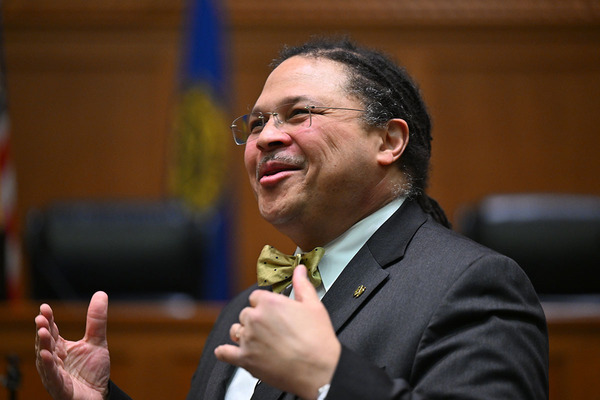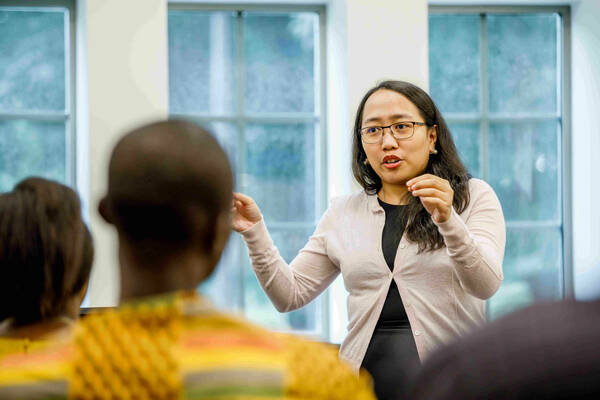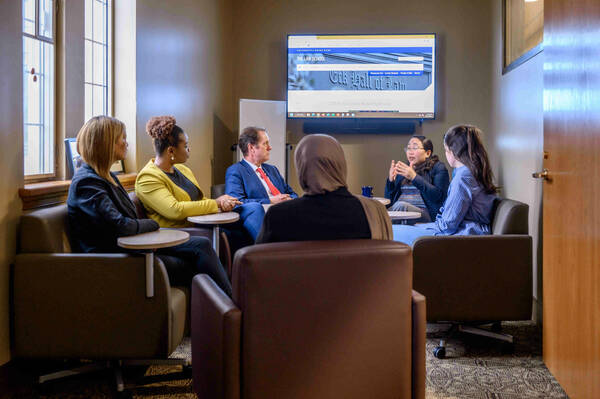Notre Dame Law School establishes new Global Human Rights Clinic
Notre Dame Law School announces the establishment of a new Global Human Rights Clinic. Launching in the spring of 2024, the new clinic will be the experiential learning unit of the Law School’s LL.M. Program in Human Rights Law and will be open to J.D. and Human Rights LL.M. students. J.S.D. students will be welcomed as Doctoral Fellows collaborating on specific clinic projects, while a few select undergraduates will contribute through limited research-focused internships at the clinic. The new clinic will draw from 50 years of unique international human rights pedagogy and theory of jurisprudence at Notre Dame, which is already being applied by Notre Dame alumni to defend human rights across the world.
The clinic will represent cases at institutions such as the International Court of Justice, Inter-American Court of Human Rights, International Criminal Court, and the U.N. Human Rights Treaty Bodies. It will also undertake research and advocacy projects in collaboration with the Office of the U.N. High Commissioner for Human Rights. In addition, the clinic will address cases challenging authoritarianism in the Global South, advocating for individuals who may not typically be represented by other human rights clinics.

"The creation of this new Global Human Rights Clinic is a testament to our unwavering commitment to make a lasting impact. The clinic will actively pursue justice under international law, hold perpetrators accountable, while providing crucial support to those striving for justice in their countries,” said G. Marcus Cole, the Joseph A. Matson Dean and Professor of Law. “As the oldest Catholic law school in the United States, this aligns seamlessly with our mission to train advocates devoted to defending and advancing human rights globally, to champion justice worldwide, and to be a force for good.”

That mission builds upon the work of Diane Desierto, the founding faculty director of the clinic. Currently serving as faculty director of the LL.M. Program in International Human Rights Law, and professor of law and global affairs, Desierto has made significant contributions since her arrival at Notre Dame in 2021. She revamped the human rights program curriculum, aligning human rights theory and practice with the Law School’s natural law pedagogy, expanded and deepened course offerings in international human rights law and designed a Graduate Seminar taught by Jean Marc Brissau. This seminar features high-level speakers from Notre Dame Law’s own alumni in the field, alongside international law and human rights academic experts. She recruited tenure-track and tenured faculty, including Francisco Urbina and Michael Addo. Additionally, she worked with Paul Miller, associate dean of international and graduate programs, in bringing leading global visiting faculty and distinguished jurists in residence, such as Justice Dumisa Ntsebeza of the African Court on Human and People’s Rights and Dr. Pablo Saavedra of the Inter-American Court on Human Rights.
Desierto recently joined the Law School delegation to South Africa that honored the African roots of Notre Dame’s Human Rights Program. They also recognized 50 years of the program’s global contributions through its alumni and celebrated the 75th anniversary of the Universal Declaration on Human Rights. While there, they built partnerships with leading academic institutions, connected with Notre Dame’s human rights LL.M. alumni, including South African Constitutional Court Justice Mbuyiseli Madlanga, and concluded with a panel honoring the eminent work of Justice Richard Goldstone at the South African Constitutional Court.
With over 20 years of experience in international human rights practice, international arbitration, and international litigation, Desierto recognized the evolving challenges faced by human rights lawyers in the contemporary world, making the continuity and expansion of the human rights program crucial.
She said, "Growing 15 to 20 international human rights lawyers from all over the world itself creates a multiplier effect as they serve innumerable individuals and groups for the rest of their lives. We equip them to make a lifelong difference in their respective countries. That is our true mandate and mission."
The notion of making a real-time impact in human rights emerged while witnessing the dramatically-deteriorating conditions in Afghanistan after the complete withdrawal of U.S. armed forces in 2021. These conditions displaced Notre Dame’s own alumni working in human rights law and put them at risk.
In a meeting with Cole and Miller, Desierto pointed out that the Afghanistan situation was not unique. Given the program's specialization in human rights law, legal professionals would inevitably encounter various risks. She said that she could teach students how to navigate dictatorships and the associated risks of human rights lawyering in these times, drawing from her own experiences in the field.
At that moment, the idea of establishing a clinic emerged, providing a platform for Notre Dame Law graduates to engage in meaningful work and contribute to the pedagogic excellence of our international human rights law program.
"Dean Cole and Paul Miller recognized that our international human rights program is our globally-renowned flagship program. We are in a time of increasing human rights violations, and our lawyers are at the forefront. What can we do to protect and support their work as effectively as possible?" Desierto asked.
She did not anticipate the Law School's swift response to establish a clinic. Cole and Miller, however, were determined, saying, "We need to open a clinic and empower our graduates to continue their work from here, while upholding the high standards of Notre Dame's human rights law."
"I didn't expect to see this clinic opening during my third year at the law school," said Desierto. "But the impact it will generate and motivation behind it are truly remarkable."
Cole agrees. "Under the visionary leadership of Diane Desierto, this clinic will shape a new era of human rights advocacy at Notre Dame Law School.," he said.

Afghanistan human rights law researcher Roqia Samim ’22 LL.M. will serve as the clinic’s global human rights legal fellow, focusing on human rights education and collaborating on the pipeline of clinic research projects at the United Nations. The clinic will also hire legal fellows for case representation. Chilean lawyer Josemaría Rodríguez ‘23 LL.M. will be the first two-year legal fellow for the clinic. A second two-year legal fellow is slated to join the team before the end of the year.
"I am very inspired to be with former students and now colleagues as we build Notre Dame Law School's Global Human Rights clinic together with our faculty on the board of advisors, our students, and our alumni who are partnering with us in defending human rights around the world,” said Desierto. “I am very proud that we will now be working together as colleagues in the active representation of clinic cases in international courts and tribunals, supplying field-driven human rights law research at the United Nations, and working with foreign courts and legislatures on drafting local statutes consistent with States’ international human rights law treaty commitments. In this way we fully complement the LL.M. in International Human Rights Law curriculum and complete our teaching portfolio by enabling students to learn from theory and methods, as well as the actual practice of international human rights law. We live our Law School and University mission in this way through our global defense of human rights, serving anywhere in the world."
A board of advisors will provide input to Cole, Desierto, and Miller. The board includes Michael Addo, Roger Alford, Paolo Carozza, Nicole Stelle Garnett, Jim Seckinger, O.Carter Snead, and Francisco Urbina.
The clinic will offer its courses starting Spring 2024, with two-credit courses in the spring semesters and four-credit courses in the fall semesters. It will be open to nine J.D and L.L.M. students, while J.S.D. students will be welcomed to collaborate in the clinic for specific projects as Doctoral Fellows (not for academic credit).

The clinic will be housed temporarily at 3301 Biolchini Hall of Law, with staff offices and conference areas also at Biolchini Hall of Law. In Fall 2024, the clinic will formally launch its inaugural ND Law Global Human Rights Conference, showcasing Notre Dame Law School's distinctive pedagogy and practice of natural law, jurisprudence, and international human rights law. The conference will platform Notre Dame Law School’s ongoing engagement with international law and human rights experts from around the world.
As part of the ongoing integration of the clinic into the Law School community, it will host a separate Notre Dame Law School Global Human Rights Lecture Series. This series will regularly feature distinguished international law and human rights judges, experts, academics, diplomats, and practitioners.
According to Desierto, this new clinic represents a powerful manifestation of the commitment articulated by Dean Cole in an article he wrote in 2020 titled, “I am George Floyd. Except, I can breathe. And I can do something.” In this article, Dean Cole challenges the law school community to undertake three actions to improve the world and restore Father Hesburgh’s original vision for Notre Dame Law School. This commitment involves advancing the fight for human rights and training lawyers for that fight, anywhere in the world.
“This marks just the beginning. Notre Dame Law School’s own global human rights alumni are already actively seeking collaboration with us on various live human rights issues in their respective jurisdictions, especially in the Global South,” said Desierto. “We are truly witnessing the strength of community and collaboration, as nothing galvanizes our human rights lawyers more than the prospect of working together in the much-needed global defense of human rights, anchored in the best pedagogic and intellectual traditions developed and cultivated at Notre Dame Law School.”
Originally published by at law.nd.edu on November 16, 2023.
Latest Research
- University of Notre Dame and IBM Research build tools for AI governanceMain Building (Photo by Matt Cashore/University of Notre Dame) …
- Smarter tools for policymakers: Notre Dame researchers target urban carbon emissions, building by buildingCarbon emissions continue to increase at record levels, fueling climate instability and worsening air quality conditions for billions in cities worldwide. Yet despite global commitments to carbon neutrality, urban policymakers still struggle to implement effective mitigation strategies at the city scale. Now, researchers at Notre Dame’s School of Architecture, the College of Engineering and the Lucy Family Institute for Data & Society are working to reduce carbon emissions through advanced simulations and a novel artificial intelligence-driven tool, EcoSphere.
- Seven engineering faculty named collegiate professorsSeven faculty members in the Notre Dame College of Engineering have been named collegiate professors—a prestigious title awarded by the university and college in recognition of excellence in research, teaching and service. The designation may be conferred on faculty at the assistant, associate or…
- ‘A special challenge’: German studies scholar wins National Humanities Center fellowship for research on medieval womenFor CJ Jones, the joy of research is not the answers but the journey. And the next step on that journey is a fellowship with the National Humanities Center. …
- Notre Dame Lead Innovation Team partners with local WIC program to identify, prevent lead poisoning in childrenB.A.B.E. store “shoppers” now have something new to help their families: free lead screening kits offered by the University of Notre Dame’s Lead Innovation Team.
- Notre Dame Welcomes Ninth Cohort of Warrior-Scholars for Transformative Academic JourneyNOTRE DAME, IN – The University of Notre Dame recently concluded its ninth successful Warrior-Scholar Project (WSP) boot camp, hosting 34 dedicated Warrior-Scholars from June 21st to 28th. This intensive, week-long academic residency provided transitioning service members and veterans…













